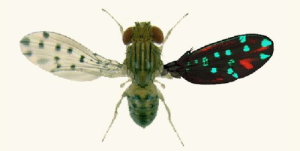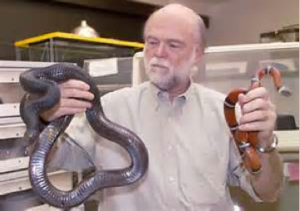 Dr. Fry is hosting Dr. Amanda Moehring, Assistant Professor, Department of Biology at the University of Western Ontario. She is presenting a talk titled, ” Sex, flies and video tape: The genetics of female mate choice and species isolation in Drosophila,” on Friday, September 13. Dr. Moehring studies the genetics of complex traits. Primarily, her research focuses on the genetic basis of variation in behavior and the genetics of species isolation. She uses the model system of Drosophila due to the extensive genetic and molecular tools this species offers, as well as the availability of species that can be hybridized in the laboratory. A mixture of quantitative genetics, molecular genetics, behavioral assays and genomics is used in order to understand these complex traits. For more information on Dr. Moehring’s research, please visit her website!
Dr. Fry is hosting Dr. Amanda Moehring, Assistant Professor, Department of Biology at the University of Western Ontario. She is presenting a talk titled, ” Sex, flies and video tape: The genetics of female mate choice and species isolation in Drosophila,” on Friday, September 13. Dr. Moehring studies the genetics of complex traits. Primarily, her research focuses on the genetic basis of variation in behavior and the genetics of species isolation. She uses the model system of Drosophila due to the extensive genetic and molecular tools this species offers, as well as the availability of species that can be hybridized in the laboratory. A mixture of quantitative genetics, molecular genetics, behavioral assays and genomics is used in order to understand these complex traits. For more information on Dr. Moehring’s research, please visit her website!
Author Archives: dlawren5
EEB Seminar, Tuesday, August 13: “The role of toolkit genes in the evolution of complex wing, thorax, and abdominal color patterns in Drosophila guttifera”
 Dr. Thomas Werner, Assistant Professor, Department of Biological Sciences at Michigan Technological University, is presenting a talk titled, “The role of toolkit genes in the evolution of complex wing, thorax, and abdominal color patterns in Drosophila guttifera,” on Tuesday, August 13.
Dr. Thomas Werner, Assistant Professor, Department of Biological Sciences at Michigan Technological University, is presenting a talk titled, “The role of toolkit genes in the evolution of complex wing, thorax, and abdominal color patterns in Drosophila guttifera,” on Tuesday, August 13.
Dr. Werner became interested in the question “What is life?” as a four-year old child in his parent’s garden in former East Germany. By the age of 10, he began to develop a life-long interest in the biology of butterflies and moths. He has been breeding and collecting them ever since. For his Master’s thesis, he decided to shift his focus to molecular biology because this was a newly emerging field of biology that promised new jobs. Thus, Dr. Werner studied the human heart disease-causing virus Coxsackie B3 at the molecular level at Friedrich-Schiller-University Jena in Germany. After the fall of the Berlin Wall, Dr. Werner made one of his childhood dreams come true and moved to Sweden. He spent seven years in Umeå, working on his Ph.D. thesis about the innate immune response in the fruit fly Drosophila melanogaster. During this time at Umeå University in Dr. Dan Hultmark’s lab, he discovered and described a new family of immune genes that we humans share with flies and many other animals. In 2005, Dr. Werner shifted his research focus towards evolution of development (evo-devo) and worked as a postdoctoral fellow at the University of Wisconsin-Madison in Dr. Sean B. Carroll’s lab, where he established the fruit fly Drosophila guttifera as a new transgenic model organism to investigate how complex animal color patterns evolve.
Dr. Werner will be visiting the Jaenike lab for three full days, from August 12 through 14. If anyone wishes to meet with him during this time, please contact Dr. John Jaenike.
EEB Seminar, Friday, June 14: “Sensory response as a selective force on signal design in Anoline lizards”
 Dr. Leo Fleishman, Professor in the Department of Biology at Union College, is presenting a talk titled “Sensory response as a selective force on signal design in Anoline lizards” on Friday, June 14. Dr. Fleishman’s research combines neurobiology and behavior to investigate how sensory systems and the environment influence signal evolution.
Dr. Leo Fleishman, Professor in the Department of Biology at Union College, is presenting a talk titled “Sensory response as a selective force on signal design in Anoline lizards” on Friday, June 14. Dr. Fleishman’s research combines neurobiology and behavior to investigate how sensory systems and the environment influence signal evolution.
To learn more about Dr. Fleishman’s research or to see some behavioral videos, check out:
EEB Seminar, Friday, May 3: “Host-parasite coevolution between sigma virus and Drosophila”
Dr. Marta Wayne, Associate Professor of the Department of Biology at the University of  Florida, is presenting a talk titled, “Host-parasite coevolution between sigma virus and Drosophila,” on Friday, May 3.
Florida, is presenting a talk titled, “Host-parasite coevolution between sigma virus and Drosophila,” on Friday, May 3.
“I study evolutionary genetics because I am fascinated by the world around us. With every small breakthrough, more questions emerge. That infinite variety and complexity, accompanied by the illusion that ‘the answer’ is just around the corner, keeps me in science. At the same time, the interplay between genetic knowledge and society, particularly with respect to ethics, informs my research and teaching.”
EEB Seminar, Friday, April 26: “The evolution of sex within populations: testing theory”
Dr. Aneil Agrawal, Associate Professor of Ecology and Evolutionary Biology of the University of Toronto, is presenting a talk titled, “The evolution of sex within populations: testing theory,” on Friday, April 26.
He is an evolutionary geneticist who is interested in general properties of genetic systems more so than the history or function of specific genes. He asks questions such as: Are sexually-derived offspring more fit than asexually-derived offspring (and why)? Do mutation and recombination rates change with condition? If so, why would it matter? To what extent are populations burdened by deleterious alleles? How do ecological and genetic factors affect this load? “I approach these problems both theoretically and empirically using the mighty fruit fly, Drosophila melanogaster.”
EEB Seminar, Friday, April 19: “Exploring lineage-specific genes in Lophotrochozoa by comparative genomics”
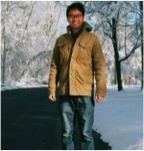 Longjun Wu, a second-year graduate student in the Lambert lab, will be giving a talk entitled, “Exploring lineage-specific genes in Lophotrochozoa by comparative genomics,” on Friday, April 19th. Longjun comes from the Southeast coast of China, where he received his B.S. in Biology from Xiamen University, studying the genome evolution of Amphixous in Dr. Yiquan Wang’s lab.
Longjun Wu, a second-year graduate student in the Lambert lab, will be giving a talk entitled, “Exploring lineage-specific genes in Lophotrochozoa by comparative genomics,” on Friday, April 19th. Longjun comes from the Southeast coast of China, where he received his B.S. in Biology from Xiamen University, studying the genome evolution of Amphixous in Dr. Yiquan Wang’s lab.
EEB Seminar, Friday, April 12: “Natural history, aesthetics, and conservation”
Dr. Harry Greene, Professor of Ecology and Evolutionary Biology, and Faculty Curator of Amphibians and Reptiles in the Museum of Vertebrates at Cornell University, is presenting a talk titled, “Natural history, aesthetics, and conservation” on Friday, April 12.
Dr. Greene received his B.A. from Texas Wesleyan College in 1968, then served three years as an army medic. He earned his M.A. from University of Texas at Arlington in 1973 and Ph.D. from the University of Tennessee, Knoxville, in 1977. For two decades he was a professor and curator of herpetology in the Museum of Vertebrate Zoology, University of California, Berkeley, then moved to Cornell in 1999. Dr. Greene has taught natural history of the vertebrates, herpetology, introductory biology, evolution and biodiversity, desert ecology, and graduate field ecology; his research has focused on snakes and other predators in the Americas, Africa, and Eurasia, with emphasis on evolution, ecology, and conservation. His honors include the Berkeley Distinguished Teaching Award, American Society of Naturalists’ Edward Osborne Wilson Award, elected fellow of the American Association for the Advancement of Science and California Academy of Sciences, 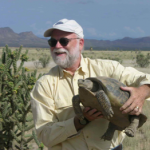 president of the American Society of Ichthyologists and Herpetologists, and Cornell’s Stephen H. Weiss Presidential Fellowship. Dr. Greene’s Snakes: the Evolution of Mystery in Nature, won a PEN Literary Award and made the New York Times’ list of 100 Most Notable Books. His next book, Tracks and Shadows: Field Biology as Art, will be published later in 2013.
president of the American Society of Ichthyologists and Herpetologists, and Cornell’s Stephen H. Weiss Presidential Fellowship. Dr. Greene’s Snakes: the Evolution of Mystery in Nature, won a PEN Literary Award and made the New York Times’ list of 100 Most Notable Books. His next book, Tracks and Shadows: Field Biology as Art, will be published later in 2013.
EEB Seminar, Friday, February 22: “Posterior growth and shell formation in Ilyanassa”
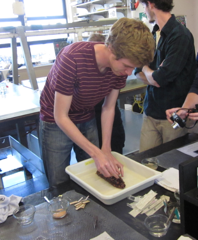 Adam Johnson, a member of the Lambert lab, will be giving a talk titled, “Posterior growth and shell formation in Ilyanassa” on Friday, February 22nd. Adam received his Biology BA at the University of Kansas, and worked with Jennifer Gleason and Paulyn Cartwright on mating behavior and Cnidarian sensory evolution, respectively. Adam is a 2nd year PhD student.
Adam Johnson, a member of the Lambert lab, will be giving a talk titled, “Posterior growth and shell formation in Ilyanassa” on Friday, February 22nd. Adam received his Biology BA at the University of Kansas, and worked with Jennifer Gleason and Paulyn Cartwright on mating behavior and Cnidarian sensory evolution, respectively. Adam is a 2nd year PhD student.
EEB Seminar, Friday, February 15: “Mutualism stability and gall induction in the fig and fig wasp interaction”
 Dr. Ellen Martinson, a post-doc in the Werren Lab, is presenting an EEB seminar entitled “Mutualism stability and gall induction in the fig and fig wasp interaction,” on Friday, February 15. Ellen recently received her PhD in Ecology and Evolutionary Biology at the University of Arizona under Elizabeth (Betsy) Arnold and Jeremiah Hackett.
Dr. Ellen Martinson, a post-doc in the Werren Lab, is presenting an EEB seminar entitled “Mutualism stability and gall induction in the fig and fig wasp interaction,” on Friday, February 15. Ellen recently received her PhD in Ecology and Evolutionary Biology at the University of Arizona under Elizabeth (Betsy) Arnold and Jeremiah Hackett.
EEB Seminar, Friday, January 11: “Host specialization and male-killer infection in the ladybird Harmonia yedoensis”
Dr. Noriyuki Suzuki recently completed his PhD at Kyoto University, Japan, where his research focused mainly on ecology of host specialization in phytophagous and predatory insects. He is continuing his research at Tohoku University, Japan, and is currently a visiting researcher in the Jaenike lab from November 2012 to January 2013. For more information on Dr. Suzuki’s research, please visit his website!

